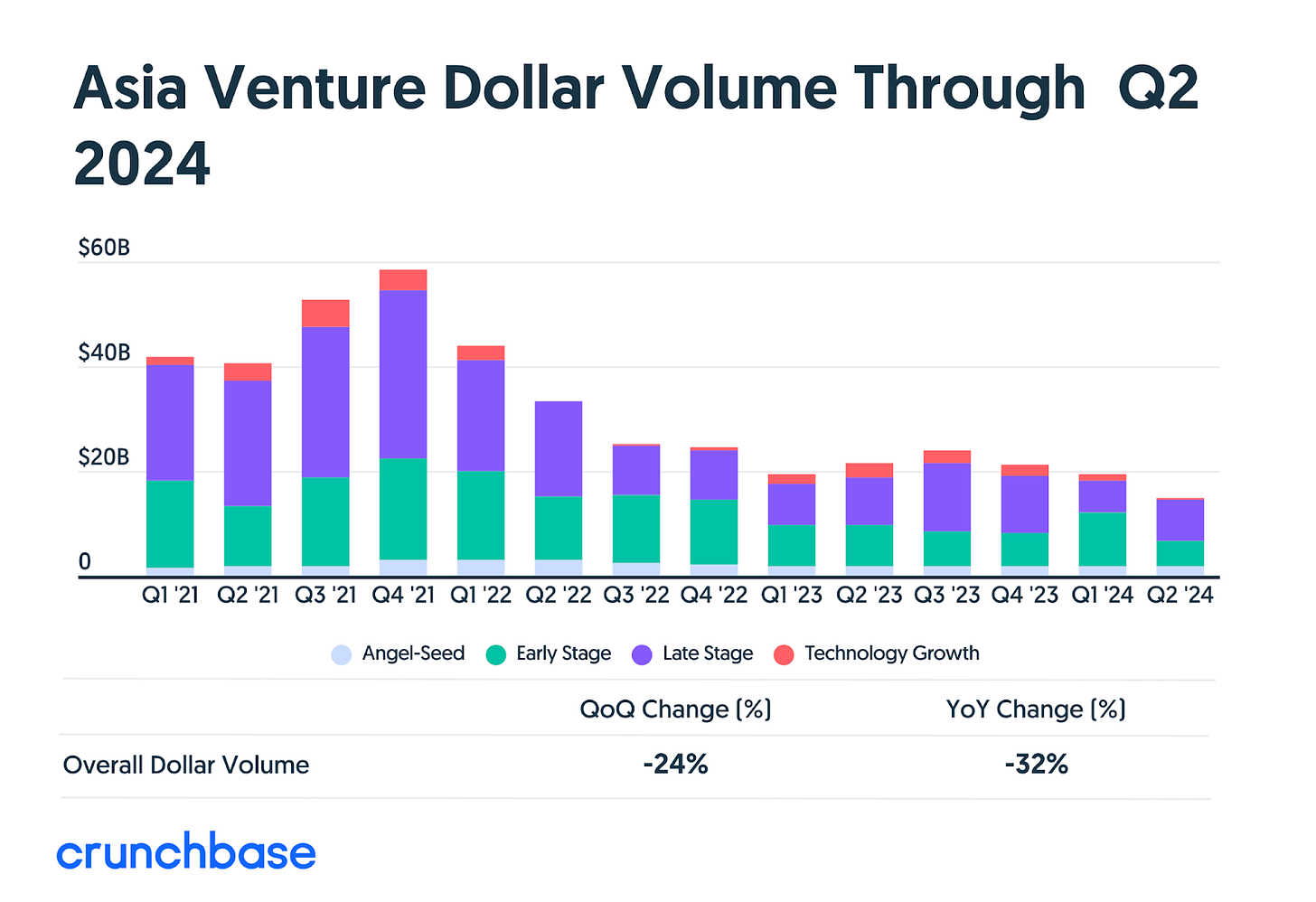Welcome back,
This week’s issue is delayed on account of England, and, well, me. First, I opted to watch the Euro final in the very early (Asia) hours of Monday morning. Yes, I should have known better. Football isn’t coming home, but I am back in the UK for a few weeks of summer—hence ATR was delayed further still.
On the subject of the Euros, it has been fascinating to see just how many Chinese tech firms have grabbed attention as high-profile sponsors. I wasn’t alone in seeing this, the FT has a nice piece looking at this phenomenon.
Normal service should resume from next week. Thanks for the patience—and allowing me to dream, albeit naively.
See you again next week!
Jon
PS: Follow the Asia Tech Review LinkedIn page for updates on posts published here and interesting things that come our way. If you’re a news junkie, the ATR Telegram news feed has you covered with news as-it-happens.
-
TikTok wants to take a bite of restaurant, leisure and travel commerce
TikTok parent company ByteDance is a typical Chinese tech firm in some ways, most notably that it operates a lot of different services which aim to build on each other. Yet, while in China the ByteDance universe is strong, its global presence has essentially been just TikTok with a dose of TikTok Shop thrown in for some markets where it has performed well.
That could change in Southeast Asia—one region where TikTok Shop has shown particular promise—with TikTok set to open itself to much more commerce, according to SCMP. Specifically, it is looking to add restaurant bookings, flights and hotels to its service in Indonesia and Thailand, two markets where social commerce on TikTok has taken off.
The idea with restaurants and travel is to tap TikTok’s ability to deliver locally relevant content in markets, whilst also tapping the more aspirational side of leisure. SCMP claims restaurant owners and travel companies are being encouraged to join “TikTok Local Services” while third-party providers will be tapped for flights and hotel offers and vouchers.
TikTok Shop competes decently with Shopee and Lazada—particularly in Indonesia where it has the might of Tokopedia behind it—but this will be an interesting test of whether ByteDance can turn TikTok from a social sensation that attracts attention, into an even more lucrative commerce beast. And that test is happening right here in Southeast Asia, which is a testbed for new features that end up in the US and other markets if deemed successful.
-
HongShan, formerly Sequoia China, raises new $2.5B fund for more sensitive deals in China
HongShan, the VC firm formerly known as Sequoia China, raised a new 18B RMB ($2.5B) fund in order to invest in “sensitive technologies.” The firm closed a $9B fund in 2022, but this renminbi vehicle is said to be freer to put capital into Chinese technology companies that might cause it challenges with the US dollar fund and the US-based LPs connected to it.
Operating dual USD/CNY funds puts HongShan somewhat into the same challenge Sequoia had, needing to balance sensitivities and politics of US-China relations whilst being able to freely invest across startups in both geographies. That ultimately played a part in Sequoia breaking up its US, China and India/SEA funds—so how will HongShan manage this difficult challenge?
-
Hong Kong toughens ride-hailing penalties as Uber continues to be illegal
In what feels like very pre-Covid news, Hong Kong is pushing for stiffer fines for illegal ride-hailing services, with a view to pushing Uber and others to being licensed as soon as next year. As part of a long-running feud between traditional taxis and upstart online rivals which don’t have car hire licenses, the Transport and Logistics Bureau is upping fines and it plans to launch premium fleets for traditional providers to increase the quality.
Hong Kong is said to have 1,500 licensed taxis but more than 10,000 drivers registered to ride-hailing services like Uber. It has been urged to arrest Uber drivers in the past year following ‘stings’ from cab drivers. Way back in 2015, Uber’s office was raided with staff members detained and some drivers arrested.
-
Asia misses out on the global VC rebound
Despite a slight resurgence across the global venture funding landscape, Asia seems to be left behind.
Crunchbase News ran the numbers and Q2 2024 was Asia’s poorest quarter for funding since the end of 2015. Asia-based startups raised just $14.6 billion in the last quarter. That represents a 24% decline from Q1 and a 32% dropoff year to year.
We know, of course, that Asia is a diverse place and that a regional grouping can miss the nuance of different parts of the continent. But still this is worrisome.
It may be telling of a refocus on the US, where AI remains a hot topic. Outside of China, which remains behind the US, Asia has no real answer when it comes to AI startups.
Chinese e-commerce vendors are struggling for survival as sales growth slows, price pressure rises and shopping platforms compete with ever-more aggressive policies to attract increasingly cost-conscious customers link
Donald Tang, a master of reinvention whose rise on Wall Street won him fame in his native China, has been brought in as the public face of Shein, where he faces the tough task of leading the fashion group as it plans its London IPO—employees joke that co-founder Sky Xu is someone they wouldn’t recognise such is his reluctance to maintain a profile. Tang is said to be “the face and the most visible leader” instead link
Shein to launch €200mn fund to tackle fashion waste as it awaits IPO approval link
X-Epic, China’s ‘rising star’ in chip design software, cuts up to half its workforce amid market headwinds link
Chinese self-driving cars have quietly travelled 1.8M miles on US roads, collecting detailed data with cameras and lasers link
Baidu robotaxis draw complaints from human drivers as service gains popularity link
Microsoft will soon require Chinese-based employees to use only Apple devices to verify their identities when logging in to work computers or phones, according to an internal memo reviewed by Bloomberg link
The company defended its request for all mainland China-based employees to use iPhones at work, saying it is necessary due to the absence of Google’s Android services there, after the decision triggered speculation over the company’s intent link
Germany will strip Huawei and ZTE equipment from its 5G networks after an agreement with telecom companies who use their parts link
Republican lawmakers want congress to investigate the partnership between Microsoft and Abu Dhabi AI firm G42, with a focus on the Emirati company’s ties to China. link
Chinese people around the world are being targeted by an elaborate scam in which criminals pretend to be Chinese police link
Temu is changing its US logistics strategy to be more like Amazon: instead of only shipping items from Chinese factories directly to customers’ homes—and avoiding paying US duties—it is signing up Chinese sellers that already have inventory in US warehouses and can ship to homes from there, as well as US merchants link
The flood of Shein and Temu packages has sparked a delivery startup gold rush in the US—that includes breathing new life into services like Hailify, once an app for Uber and Lyft drivers to manage their work it now helps deliver packages that arrive from China link
CATL, the world’s biggest electric vehicle battery maker, has held talks with overseas sovereign wealth funds and the private offices of the super-rich about raising a $1.5B fund to build out its global supply chain link
Transsion, the world’s fourth-largest smartphone maker, is being sued by Qualcomm and Philips for alleged intellectual property violations link
ByteDance, Alibaba, SenseTime lead generative AI infrastructure services market in China link
OpenAI’s China ban has a loophole (for now) — it doesn’t apply to customers of Microsoft’s Azure business in China link
Chinese artificial intelligence startups that have raised hundreds of millions of dollars in funding are facing a reckoning: find customers fast, or get crushed or swallowed up by tech giants link
Apple sent out a warning to a number of India-based iPhone users to warn that their devices may have been infected with Pegasus spyware link
An investigation by India’s antitrust body has reportedly found that Apple exploited its dominant position in the market for app stores on its iOS operating system, engaging “in abusive conduct and practices” link
Investors are betting on Indian wealthtech startups as a growing middle class turns to diversify investments and startups challenge traditional financial advisors for HNW clients link
-
Premji Invest is close to leading a $30-$40M funding round for Dezerv, an app providing investment solutions, at around $170M pre-money valuation, double its previous round
-
Lightspeed Venture is in advanced talks to lead an investment round larger than $20M in Centricity, a digital wealth management platform
WhatsApp now allows businesses to send authentication codes to users in India link
Reliance Industries may reportedly consider spinning off its telecom arm Jio for a public listing as early as 2025 link
Goldman Sachs is in advanced stages of talks to double down on enterprise SaaS company MoEngage with a $35-50M investment through a secondary deal link
Agritech startup Arya Ag raised $29M from Blue Earth Capital link
India’s technology sector will need more than 1M engineers with advanced skills in AI and other capabilities over the next 2-3 years, an industry body estimates—that’s a demand it says won’t be met unless the government significantly beefs up education and training in the country link
Softbank exits Paytm at loss of around USD 150 million link
Partior, a Singapore-based blockchain payment network that’s backed by banking giants JPMorgan, DBS and Standard Chartered, raised $60M led by Peak XV Partners, Valor Capital Group and Jump Trading Group. JPMorgan, Standard Chartered and existing investor Temasek also joined the round link
New research reveals how all the secondary services enabling pig butchering can be found on a single Cambodian online platform—part of a company linked to the Cambodian ruling family—known as Huione Guarantee. link
Crypto-tracing firm Elliptic published a report that delves into crypto scammers’ extensive use of Huione Guarantee, a deposit and escrow service for peer-to-peer transactions that lets users buy and sell over the Telegram messaging service with the cryptocurrency Tether while preventing them from defrauding each other.
Tether freezes $29 million of cryptocurrency connected to Cambodian marketplace accused of fuelling scams link
A number of startups are working to digitise sari-sari shops, or convenience stores, which are a large part of the Philippine retail industry link
Malaysian crypto miners stole $722M worth of power, according to the deputy energy transition and water transformation minister link
A union representing workers at South Korean technology giant Samsung Electronics has called on its roughly 30,000 members to go on strike indefinitely, as part of its campaign for better pay and benefits link
Samsung in crisis: AI chip ambitions hit by unprecedented worker unrest link
-
Samsung Electronics is wrestling with an escalating labour crisis that is complicating its efforts to catch up with rivals in the booming market for semiconductors used in artificial intelligence systems.
-
The Korean technology giant pleased investors earlier this month with its expectations that second-quarter operating profits would increase by almost 1,500 per cent year-on-year, as the global memory market rebounds from a prolonged slump.
-
But the stronger-than-expected guidance came amid growing worker unrest and setbacks in chip production that have seen it fall behind rivals in areas identified as essential for future growth. Samsung shares have risen about 7.5 per cent this year, against a 65 per cent rally for smaller domestic rival SK Hynix.
-
Samsung is trailing SK Hynix and US chipmaker Micron in developing high-bandwidth memory (HBM) chips, a crucial component of AI systems, and is yet to pass tests required to qualify as an HBM supplier to the industry leader Nvidia.
South Korea-based VFX startup Beeble AI raised $4.75M to launch a virtual production platform for indie filmmakers link
Shift Up, a gaming firm backed by Tencent, closed the first day of its public listing up 18% after raising $320M from its Seoul IPO—the largest South Korean listing from a gaming company since Krafton raised $3.8B in 2021 link
TSMC hit a $1T market cap following a strong share price rally powered by AI link
Uzbekistan mobile bank TBC raised $38.2M to expand its financial products link
SoftBank acquires UK AI chipmaker Graphcore in an undisclosed deal reportedly worth $500M link






